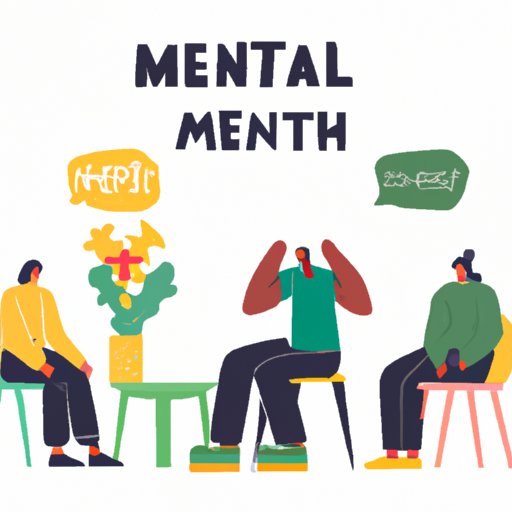
Introduction
Mental health counseling is a branch of therapy that focuses on assessing and treating individuals with various mental disorders. Mental health counselors work with clients of all ages to provide assistance and support in managing their mental disorders, improve well-being, and live fulfilling lives. The importance of mental health counselors in society cannot be overstated. They are instrumental in helping people overcome their mental health problems and regain control of their lives.
A Day in the Life of a Mental Health Counselor
The day-to-day responsibilities of a mental health counselor can be diverse and challenging. Arriving at the office, a counselor checks their schedule, plans their day, and review notes from previous clients. Throughout the day, a counselor will meet with clients to discuss their conditions, concerns, and treatment options. Counselors may spend time researching and collaborating with a team of healthcare professionals to create treatment plans that meet the clients’ unique needs. As a counselor, it is crucial to have excellent listening and communication skills and to create a safe and non-judgmental environment for clients to discuss their feelings openly.
Understanding the Role of a Mental Health Counselor
Mental health counselors play a crucial role in supporting clients with mental health disorders by providing insight, counseling, and coping strategies. They help clients understand their emotions, feelings, and behaviors. Mental health counselors work with individuals, couples, and families to identify and develop coping strategies for different types of mental health conditions, including anxiety, depression, bipolar disorder, or post-traumatic stress disorder (PTSD).
The different types of mental health counselors and their specializations vary based on the type of mental health conditions and age of the client they support. For example, a school counselor works with children and adolescents, while a geriatric counselor support adults aged 65 and older.
Mental health counselors provide various services to their clients. These include individual or group therapy, crisis intervention, career counseling, substance abuse counseling support, and psycho-education, to name a few.
Coping with Mental Illness: The Role of Mental Health Counselors
Counselors provide acute support and coping mechanisms during a mental health crisis. Mental health counselors utilize a wide range of therapeutic approaches, such as cognitive-behavioral therapy, solution-focused brief therapy, and acceptance and commitment therapy. These approaches help clients recognize and transform their negative thought patterns, manage challenging emotions, and establish healthy relationships with others.
Therapeutic approaches must be personalized to suit the unique needs of each client, which requires a thorough understanding of the client’s symptoms and circumstances. Mental health counselors work closely with clients to identify and modify problematic behaviors, thoughts, and emotions. They work collaboratively with clients to develop action plans that enable them to lead fulfilling and satisfying lives.
Success in mental health counseling involves teamwork and a willingness to explore alternative and innovative approaches. By understanding the client’s unique perspective and tailoring treatment to their specific issues, counselors can pave the way for success.
The Importance of Mental Health Counseling
The impact of mental health counselors goes beyond treating mental health conditions. Mental health counselors help individuals navigate life in a more balanced and positive way. By providing support and counseling services to those who need it, mental health counseling can help improve community well-being, reduce the stigma associated with mental health, and improve the quality of life for individuals who may be experiencing challenging life circumstances.
It is vital that mental health counseling is embraced and promoted as an essential part of overall physical and mental wellness. Mental health can be affected by many factors, including grief, workplace stress, relationship breakups, and life transitions. The accessibility of mental health resources and support has a significant impact on overall mental health and quality of life within a society.
Tools and Techniques Used by Mental Health Counselors
Mental health counselors use a wide variety of therapeutic techniques and approaches to help individuals with mental health disorders. Some of these approaches include cognitive-behavioral therapy, dialectical behavior therapy, and humanistic therapy. Often, different approaches can be combined to provide the most effective treatment for a given individual.
Mental health counselors often work with individuals who have experienced trauma, and they use evidence-based therapeutic techniques, such as exposure therapy and eye-movement desensitization and reprocessing (EMDR), to help manage post-traumatic stress disorder (PTSD).
Counselors may explore other therapeutic practices that incorporate physical activity, such as yoga or art therapy. These practices are used to help individuals express their thoughts, experiences, and emotions indirectly and focus on their mental wellness.
Successful cases of mental health counseling have been closely documented, and while progress is not linear, success can be achieved when the client is committed to the process and is paired with a dedicated, experienced counselor.
Mental Health Counseling Career Guide
Individuals interested in becoming mental health counselors should pursue a relevant degree and complete additional training. Most mental health counselors hold either a Master’s degree or Ph.D. in clinical psychology or counseling. These degrees must be earned from an accredited institution. After graduation, individuals must complete a supervised mental health counseling internship and pass a state licensure exam to work independently as a mental health counselor.
When it comes to successful careers in counseling, possessing excellent communication skills, compassion, empathy, and an ability to make quick and effective critical decisions is critical.
Conclusion
Seeking help for mental health disorders is crucial as everyone deserves to live a fulfilling life. Mental health counselors play an integral role in supporting individuals with mental health disorders, assisting them in managing their symptoms, and improving their overall quality of life. We should continue to spread awareness and encourage people to seek professional help. If you or a loved one is experiencing any mental health problems, don’t hesitate to reach out to a professional mental health counselor, there is no shame in it.





